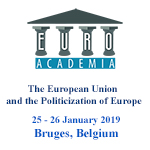Euroacademia Conferences
 Europe Inside-Out: Europe and Europeanness Exposed to Plural Observers (9th Edition) April 24 - 25, 2020
Europe Inside-Out: Europe and Europeanness Exposed to Plural Observers (9th Edition) April 24 - 25, 2020 Identities and Identifications: Politicized Uses of Collective Identities (9th Edition) June 12 - 13, 2020
Identities and Identifications: Politicized Uses of Collective Identities (9th Edition) June 12 - 13, 2020 8th Forum of Critical Studies: Asking Big Questions Again January 24 - 25, 2020
8th Forum of Critical Studies: Asking Big Questions Again January 24 - 25, 2020 Re-Inventing Eastern Europe (7th Edition) December 13 - 14, 2019
Re-Inventing Eastern Europe (7th Edition) December 13 - 14, 2019 The European Union and the Politicization of Europe (8th Edition) October 25 - 26, 2019
The European Union and the Politicization of Europe (8th Edition) October 25 - 26, 2019 Identities and Identifications: Politicized Uses of Collective Identities (8th Edition) June 28 - 29, 2019
Identities and Identifications: Politicized Uses of Collective Identities (8th Edition) June 28 - 29, 2019 The European Union and the Politicization of Europe (7th Edition) January 25 - 26, 2019
The European Union and the Politicization of Europe (7th Edition) January 25 - 26, 2019 7th Forum of Critical Studies: Asking Big Questions Again November 23 - 24, 2018
7th Forum of Critical Studies: Asking Big Questions Again November 23 - 24, 2018 Europe Inside-Out: Europe and Europeanness Exposed to Plural Observers (8th Edition) September 28 - 30, 2018
Europe Inside-Out: Europe and Europeanness Exposed to Plural Observers (8th Edition) September 28 - 30, 2018 Identities and Identifications: Politicized Uses of Collective Identities (7th Edition) June 14 - 15, 2018
Identities and Identifications: Politicized Uses of Collective Identities (7th Edition) June 14 - 15, 2018
EU’s Civil Society Bias in the Neighbourhood: A Case Study on Culture
-
-

-
Presentation speakers
- Riccardo Trobbiani, United Nations University – CRIS, Bruges, Belgium
- Domenico Valenza, United Nations University – CRIS, Bruges, Belgium
Abstract:
What constitutes ‘civil society’ (CS) in countries that do not share many of the fundamental political, social and cultural features of liberal Western societies? Does the EU engage with societal actors that do not resemble its own idea of CS as either independent from political and religious ties or showing a clear liberal and democratic character in the content and promotion of its political and religious goals? While an encompassing reflection on these aspects is beyond the reach of this work, the following analysis seeks to provide a case study with a thematic focus. It looks at EU cultural relations with Neighbourhood countries and in particular at EU’s financial and technical support to their cultural actors. The EU has developed a sound experience in supporting the cultural sector in ENP countries. However, this study seeks to enquire whether the boundaries of what cultural sector means for the EU are mostly based on a Eurocentric understanding of CS or rather on a more inclusive definition mediated with the nature of societies in partner countries. The works starts from a hypothesis that the EU tends to approach and support Civil Society Organisations (CSOs) in the field of culture on the basis of their closeness to European standards, norms and values. The findings of the paper highlight a mixed picture. On the hand, a Eurocentric understanding of CS prevails in EU discourses and is enforced upon CSOs by technical means: strict requirements concerning the status and capacity of the organisations involved, with few exceptions. However, a strong emphasis on capacity building partly mitigates this approach, rather aiming at approximation to European standards. On the other hand, the EU does not seem to impose strong requirements concerning the agenda of organisations and aims to be as inclusive as possible. Nonetheless, factors that are structural to the cultural sector, particularly in the ENP South, possibly exclude actors that are far from European values and discourses a priori.
-
Related Presentations













